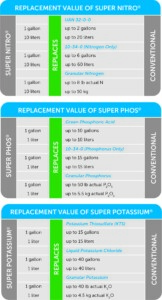Micro Carbon Technology® is a proprietary blend of extremely small organic carbon- and oxygen-rich molecules that act as a source of carbon and provide an ultra-efficient vehicle to move nutrients and other molecules into the plant through the soil and/or the leaves.
How does it work? Watch the video.
Products powered by Micro Carbon Technology® can be up to 10x more efficient than conventional fertilizers. Using MCT as the base, we have developed a full line of effective products for virtually every type of application. By building upon this base, the result is:
- Enhanced activity and diversity of beneficial soil microorganisms.
- Improved soil physical structure.
- Enhanced nutrient availability and uptake,
- Dramatically increased product use efficiency.
Our products rapidly deliver essential nutrition to your crop for optimal growth, fruiting, and vigor. The results are higher quality, increased yield, and maximum profit.
Read the full brochure.
For more information, go to our Micro carbon Technology® page.
Related Posts

HUMA GRO® ZAP® CAULIFLOWER TEST FIELD IN SPAIN
Distributor: Huma Gro Hispaña HUMA GRO® application was ZAP® 5L/ha The cauliflower on the left was planted 3 weeks earlier than the cauliflower on the right, meaning the control is an older crop—although it looks worse for wear and is shorter. The two groups have equal nutrition programs: the difference is time and ZAP® at 5L/ha.

Huma Gro®: The World’s Most Efficient Delivery of Crop N-P-K Nutrients
Huma Gro® products with Micro Carbon Technology® offer an unsurpassed level of application efficiency, allowing farmers to grow more with less fertilizer input. Growing more with less lowers input costs and maximizes return on investment. It also decreases the amount of N-P-K residues that can negatively impact the environment.

What Is Soil? (Part 1.1)
by Johann Buck, PhD This two-part article continues our 2015 series on soil as we recognize the International Year of Soils. In Part 1.1 we define soil and its formation. In Part 1.2 we’ll continue with soil texture, structure, and color. “Daddy, which is this – soil or dirt?” That’s the question Billy asked his father

